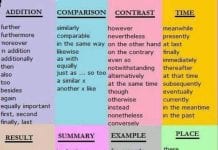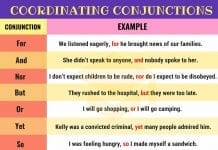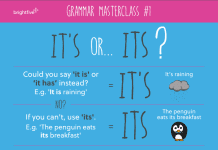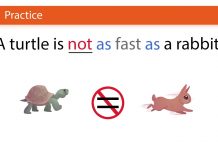
I don’t understand when to use Present Perfect Simple and Present Perfect Continuous. Can you explain it?
The Present Perfect tense might be one of the main reasons why English language learners all over the world hate grammar. It expresses a time aspect that is either non-existent in their language or is expressed with totally different tools.
To help you overcome this difficulty, I would like to draw your attention to the KEYWORDS and phrases that are often used together with Present Perfect. If you memorize these expressions, you won’t have to think about WHY you are using Present Perfect, you can just use it automatically. These keywords usually have the same position in the sentence, so you will also learn the correct word order!
Present perfect simple is a useful way to describe actions or activities that have already happened. Get started learning English with our free online lessons!
Present Perfect Simple meaning
1. The present perfect simple tense is used when describing an action or event that has already happened in time.
2. It’s also known as a past continuous activity.
3. In English, the present perfect simple tense is formed by adding -ed to the verb form.
4. Example sentence: if I said “I have been studying French for two years now,” then I would be using the present perfect simple tense.
Form of Present Perfect Simple
I / you / we / they = HAVE or 3rd person: he / she = HAS
+ list of irregular verbs or regular verbs with -ED
In grammar, the present perfect tense (or past continuous) indicates that an action was completed in the past but continues into the present.
Form in Sentence
For example, I have been studying for three years means that I began studying three years ago and still study today.
Use of Present Perfect Simple
tense (have + past participle) is used to describe something that happened before now or was true at some point in the past.
Use in a sentence
POSITIVE Sentences (form in sentence)
- I have read a book. I’ve read a book.
- He has read a book. He’s read a book.
NEGATIVE Sentences (form in sentence)
- I have not read it. I haven’t read it.
- He has not read it. He hasn’t read it.
QUESTION Sentences (form in sentence)
- Have you read it?
- Has he read it?
ever, never
- Have you ever been to Turkey?
- Has your mother ever read your diary?
- I’ve never eaten sushi.
- Laura has never seen the sea.
Use ’ever’ in questions and ’never’ in negative sentences.
For positive sentences you can add the word ’already’:
- I’ve (already) been to Turkey twice.
- Laura’s (already) seen the sea.
already, yet, so far
(until now)
- Have you done your homework yet?
- Has your sister arrived yet?
- I haven’t cleaned the windows yet.
- They haven’t called yet.
- Sue hasn’t bought the tickets yet.
- I’ve already bought them.
- He’s already called.
- They’ve already arrived.
- I’ve sent out ten invitations so far.
- I’ve had no problems with my new car so far.
- How many museums have you visited so far?
Use ’yet’ for questions and negative sentences and ’already’ for positive sentences. ’So far’ may be used in every case.
just
(completed a short time ago)
- I’ve just met the new boss.
- She’s just called.
- We’ve just finished lunch.
- They’ve just bought a new car.
- The train’s just left.
recently, lately
(completed not long ago)
- Have you seen any good films recently?
- I haven’t met him lately.
- Has she been here recently?
- They haven’t practised a lot lately.
still
(used when something is not done until now, but we expected it to be done)
- I wonder where Jack and Tim are. They still haven’t called.
- My mum’s getting better, but she still hasn’t recovered fully.
- The guests can be here any minute and you still haven’t got dressed!
how long/ since/ for, for ages
(action started in the past and still in progress in the present)
- How long have you known Janet?
- I’ve known her for ages.
- She’s had that car for two years.
- Peter and Robert have been best friends since they were kids.
- My parents have been married since 1980.
KeyWords of Present Perfect
ever, never, already, ever, just, never, yet, not yet, so far, till now, up to now, recently, lately, still, since, for ages.
Perfect Sentences:
- Have you done your homework yet?
- The train’s just left.
- Has she been here recently?
PRESENT PERFECT CONTINUOUS
For of Present Perfect Continuous
HAVE/HAS BEEN + …ING
Use of Present Perfect Continuous
POSITIVE Sentences
- I have been living here for a long time. I’ve been living here for a long time.
- She has been living here for a long time. She’s been living here for a long time.
NEGATIVE Sentences
- I have not been living here for a long time. I haven’t been living here for a long time.
- She has not been living here for a long time. She hasn’t been living here for a long time.
QUESTIONS Sentences
- Have you been living here for a long time?
- Has she been living here for a long time?
how long / since / for, for ages
(action started in the past and still in progress in the present)
- How long have you been working here?
- I’ve been working here since 2002.
- Tom’s been doing karate since he was five.
- They’ve been looking for a flat for months.
- I’ve been taking singing lessons for a year.
- John and Suzie have been going out for ages.
What’s the difference between Present Perfect Simple and Present Perfect Continuous?
- I’ve worked here for two years.
- I’ve been working here for two years.
When you use the continuous form (WORKING), the focus is on the present. It shows that ’working’ is in progress at the moment. It may not be a permanent situation.
When you use the simple form (WORKED), it shows that the situation is permanent. The focus is on the time that has passed. I have COMPLETED two years of work.
Look at the following examples:
- I’ve written a hundred pages. (100 pages are completed)
- I’ve been writing this book for months. (I am still writing, the book is not completed)
- We’ve discussed it. (we are not talking about it anymore, the discussion is completed)
- We’ve been discussing it for hours. (we are still talking about it)
- I’ve painted the kitchen yellow. (the work is completed)
- I’ve been painting the kitchen all day. (I am still painting, it’s not completed)
- I’ve been calling people all morning. (I’m still calling people, it’s not completed)
- I’ve called ten people so far. (those ten calls are completed)
Note: state verbs can’t be used in the continuous form.
- I’ve known her for ten years. (I still know her, but the form ’knowing’ is NOT correct)
- I’ve had this car for a year. (I still have it, but the form ’having’ is NOT correct)
lately / recently
(action repeated many times not long ago)
- I’ve been exercising a lot lately.
- You haven’t been practicing your French lately.
- I’ve been seeing him a lot recently.
- My son’s been drawing cartoons recently.
- Tim’s been talking a lot about you lately.
WHAT HAVE YOU BEEN DOING? recently finished activity with visible results in the present
- ’Why are you so red?’ ’I’ve been sunbathing.’ (I stopped sunbathing a short time ago and now you can see the result)
- ’Why are you covered in paint?’ ’I’ve been decorating the kitchen.’ (I stopped decorating a short time ago and now there’s paint on my clothes)
- ’Why are you sweating? Have you been running?’ (the person is sweating, he or she stopped running a short time ago)
- My mum is exhausted. She’s been cleaning the windows. (she stopped cleaning them a short time ago and now she’s exhausted)
Question and Answers
What is the difference between the present perfect simple and continuous form?
The main difference between these two tenses is that the present perfect simple indicates an action that has been completed at the moment of speaking while the continuous tense refers to actions that continue into the future.
Present Perfect Continues Sentence Example: He has been traveling for a long time.
We use simple present sentences to talk about events that happen frequently, like everyday life. We use the present perfect tense to talk about events in the past time that still continue to affect us.
What are the differences between lately and recently in present perfect simple?
The difference between lately and recently is that lately refers to an action that happened within the last few days while recently refers to an action that took place within the past few weeks.
How to Teach the Continuous Present Perfect?
Exercise:
Use images to ask how long a person has been doing a certain activity.
- What does that person doing?
- How long has this person been doing that something?
For example, “She has been working on her computer for several hours. How much longer does she plan to work on it?”
More Lessons
- 200 Most Common Irregular Verbs + Gerunds
- Action Verb vs Linking Verb vs Helping Verbs vs Irregular Verb vs Modified Verb
- What is the difference between a regular verb and an irregular verb?
- 20 Collocations with UNDER: UNDERWATER, UNDERCOVER, UNDER THE INFLUENCE,…
- Assertive vs Aggressive 😤 Which is Positive and Which is Negative?
- Present Perfect x Present Perfect Continuous
- How to make Past Participle, Present Perfect Sentences etc.?
- When to use FOR and SINCE with Present Perfect?
- 9 Brilliant Websites to Learn and Practice Present Perfect
- How To Use Simple Present
- I am a little confused with changing the following statement to indirect speech As per the rule the simple present should change to simple past but it doesn’t seem correct for this sentence
- What are simple verbs?
- Imperfect Tense Examples in English
- 30 Different Ways to Ask WHAT ARE YOU DOING
- 12 😍 English Tenses with Examples
- How to respond to HOW ARE YOU? 8 Examples
- When do we use ALREADY, STILL, YET, JUST?
- Activity in active voice?
- Lack of physical activity can be the cause ______ childhood obesity in developed countries. (a) of (b) with (c) for (d) to
- What is the difference between Many Times and Several Times?
- Students are requested to have the ID Card on their person at all times.
- Which is the correct position of sometimes?
- When to use FOR and SINCE with Present Perfect …
- When do we use ALREADY, STILL, YET, JUST?
- Advanced English Grammar and Vocabulary Test
- 12 (All) English Tenses with Examples
- Past perfect and simple past tense
Browse by category
A Adjectives B Business English C D dictionary E English grammar English Idioms English language English Learning Tips English phrases English teacher English Vocabulary English Vocabulary English words F G H how to learn english I idioms Infographic J L Learn English M N noun O P phrasal verb R S Skype T teach English Teaching English as a foreign language Text Abbreviations The Jungle Book tips U W Y
- Abbreviations
- acronyms
- Advanced English Lesson
- Adverbs
- Apps
- Arabic
- Articles
- Beginner English
- Books
- Business English
- Clauses
- Collocations
- Conjunctions
- Difference Between
- English Grammar
- English Idioms
- English Learning Tips
- English Questions and Answers
- English Speaking
- English Test
- English Videos
- English Vocabulary
- English Vocabulary Dictionary
- English Writing
- For Kids
- For Teachers
- French
- Games
- German
- Hindi
- Hungarian
- IELTS
- Infographics
- Intermediate English
- Italian
- Japanese
- Learn English
- Listening Skills
- Lyrics
- Names
- Phrasal Verbs
- Portuguese
- Prefix
- Prepositions
- Proverbs
- Q&A
- Quiz
- Quotes
- Russian
- Should
- Spanish
- Suffix
- Synonyms
- Teach English
- Technology
- Uncategorized
- Understanding
- Useful English learning websites
- Vietnamese
Latest comments

Hello. Thank you very much for the most detailed and clear explanation! Could you please comment on this sentence where…

“Hey there! Just wanted to send you a bunch of good luck vibes as you go for captain of the…

i need a good luck message for a teen trying out for captain of the drill team with the word…

Very useful for learning english language. Thank you!

thanks for post


























